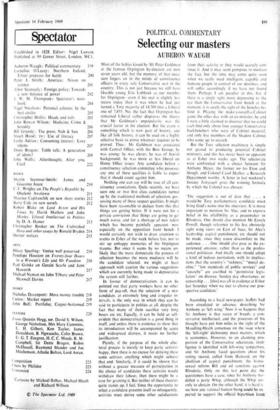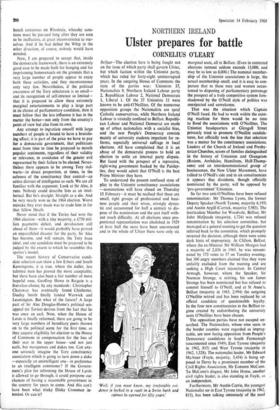Selecting our masters
POLITICAL COMMENTARY AUBERON WAUGH
Most of the babies kissed by Mr Peter Goldman at the famous Orpington by-election are now seven years old, but the memory of that occa- sion lingers on in the minds of constituency officers in every safe Conservative seat in the country. This is not just because we still have likeable young Eric Lubbock as our member for Orpington—even if his seat is slightly less secure today than it was when he had just turned a Tory majority of 14,760 into a Liberal one of 7,855. No, the fact that Orpington has remained Liberal rather disproves the theory that Mr Goldman's unpopularity was the crucial factor in the election. But the event is something which is now part of history, and like all folk history, it can be used on a highly selective basis to prove whatever requires to be proved. Thus: Mr Goldman was associated with Central Office; with the Bow Group; he was young; he was clever; he was of Jewish background; he was more or less liberal on Home Office issues. Any candidate before a constituency selection committee who possesses any one of these qualities is liable to expect that it should count against him.
Nothing one can say will be true of all con- stituency associations. Quite recently, we have seen one or two first class candidates turned up by the traditional methods of selection, pos- sessing many of these suspect qualities. It might have been reasonable to deduce from this that things are getting better. If it were not for a private conviction that things are going to get much worse, and for a shortage of new talent which has become painfully apparent--now especially on the opposition front bench- I would certainly not wish to draw attention to events in Esher of the week before last, nor to stir up unhappy memories of the Orpington trauma. But since it seems by no means un- likely that the more democratic the process of selection becomes the more mediocre will be the candidate selected, we might at least approach with caution the various suggestions which are currently being made to democratise the system still further.
- In favour of democratisation, it can be pointed out that party workers have no other form of pay-off, that the selection of a new candidate, at extremely long and irregular in- tervals, is the only way in which they can be said to participate in politics at all, despite the fact that many of them sacrifice very long hours etc etc. Equally, it can be held as self- evident that democratisation is a good thing in itself, and unless there is evidence to show that its introduction will be accompanied by acute and widespread distress, it needs no further justification.
Plainly, if the purpose of the whole elec- toral process is merely to keep party activists happy, then there is no excuse for denying these same activists anything which might achieve that end. Similarly, if it could be shown that without a greater measure of participation in the choice of candidates these activists would withdraw their labour, then there might be a case for granting it. But neither of these theories quite stands up, I feel. Since the opportunity to select a candidate presents itself so infrequently, activists must derive some other satisfactions
from their activity or they would scarcely con- tinue it. And it may seem pompous to mention the fact, but the time may come quite soon when we really need intelligent, capable and humane people in control of our destinies. and
will suffer accordingly if we have not found them. Perhaps I am peculiar in this, but if there is a single sight more depressing to the eye than the Conservative front bench at the moment, it is surely the sight of the benches be- hind it. Playing the make-yourself-a-Cabinet game the other day with an ex-minister. he and I were a little alarmed to discover that we could each find only about four younger Conservative backbenchers who were of Cabinet material, and only five members of the Shadow Cabinet who came up to scratch.
But the Tory selection machinery is simply not geared to producing potential Cabinet ministers, and this has never been so apparent as at Esher two weeks ago. The selectorate were confronted with a choice between Sir Anthony Meyer, the former NIP for Eton and Slough, and Colonel Carol Mather, a Research Department worthy. A letter in last weekend's Sunday Telegraph gives the winning formula by which the Colonel was chosen: 'The suggestion is out of date that . . . a would-be Tory parliamentary candidate must bring God's name into his interview. It is more important to mention Sir Alec, and to express belief in his infallibility as a peacemaker in Rhodesia. One should also mention Mr Enoch Powell, though reference to his less obviously right wing views on East of Suez, Sir Alec's leadership, capital punishment, etc should not be made, since they cause discomfort to the audience. . . . One should also pose as the ex- perienced amateur, rather than as the profes- sional politician. And finally one should adopt a kind of tedious puritanism, with its implica- tions that the country's "sickness," "moral de- cline," "low standards of public services" and "anarchy" are ascribed to "permissive legis- lation" on divorce, Sunday day observance, or censorship ... [this] was all in evidence at Esher last Saturday when we met to choose our pro- spective candidate.'
According to a local newspaper, leaflets had been circulated in advance, describing Sir Anthony as 'left wing.' Now it so happens that Sir Anthony is that rarest of breeds, a con- servative intellectual, and the processes of his thought have put him miles to the right of the Maudling-Heath consensus on the issue where the 'left-right' dichotomy most matters, which is economics. However, to an alarming pro- portion of the Conservative selectorate, intel- ligence is identified with left-wing sympathies, and Sir Anthony faced questions about his voting record, culled from Hansard, on the abolition of capital punishment, the homo- sexual reform Bill and oil sanctions against Rhodesia. Only on this last point dtd the questioners have a case, since Sir Anthony hail defied a party Whip, although the Whip wa• only to abstain. On the other hand, it is hard tt see how any rational human being could be ex pected to support the official bipartisan front
bench consensus on Rhodesia, whereby sanc- tions must be pursued long after they are seen to be ineffective, at great inconvenience to our- selves. And if he had defied the Whip in the other direction, of course, nobody would have minded.
Now, I am prepared to accept that, inside the democratic framework, there is an extremely good case to be made both for hanging and for imprisoning homosexuals on the grounds that a very large number of people appear to enjoy both these activities, and they inconvenience only very few. Nevertheless, if the political awareness of the Tory selectorate is so small— and its recognition of self-interest so limited— that it is prepared to allow these extremely marginal entertainments to play a large part in its choice of parliamentary candidate, then it must follow that the less influence it has in the matter the better—not only from the country's point of view but also from its own.
Any attempt to ingratiate oneself with large numbers of people is bound to have a brutalis- ing effect; it is part of the price we have to pay for a democratic government, that politicians must from time to time be prepared to mouth popular sentiments, regardless of their validity or relevance, in avoidance of the greater evil represented by their failure to be elected. Never- theless there appears to be among Tory stal- warts—in direct proportion, at times, to the safeness of the constituency they control—an active distrust of intelligence as such. We are all familiar with the argument. Look at Sir Alec, it runs. Nobody could describe him as an intel- lectual. But he's straight. Straight as a die. And he very nearly won us the 1964 election. Worst mistake they ever made was to trade him in for that fellow Heath.
Never mind that if the Tories had won the 1964 election—with a tiny majority, a f750 mil- lion payments deficit, and devaluation still ahead of them—it would probably have proved an unparalleled disaster for the party. Sir Alec has become, and will remain, the Tory beau ideal, and any candidate must be prepared to be judged by the extent to which he resembles this spotter's model.
The recent history of Conservative candi- date selection can show a few Eshers and South Kensingtons, it is true, where the duller, less talented man has proved the more acceptable; but there have also been a fair number of more hopeful ones. Geoffrey Howe in Reigate is a first-class choice, by any standards : Christopher Chataway has eventually found Chichester, Dudley Smith finally landed Warwick and Leamington. But what of the future? A large part of Sir Alec Douglas-Home's political sex- appeal {to Tories) derives from the fact that he was once an earl. Now, when the House of Lords is finally reformed, there are going to be very large numbers of hereditary peers thrown on to the political scene for the first time, as they acquire eligibility for election to the House of Commons in compensation for the loss of their seat in the upper house—and not just earls, but marquesses and dukes too. Can any- one seriously imagine the Tory constituency association which is going to turn down a duke —especially an unintelligent one—in preference to an intelligent commoner? If the Govern- ment's plan for reforming the House of Lords is allowed to go through, it could postpone our chances of having a reasonable government in the country for years to come. And this can't have been what tricky Dicky Crossman in- tended. Or can it?



































 Previous page
Previous page